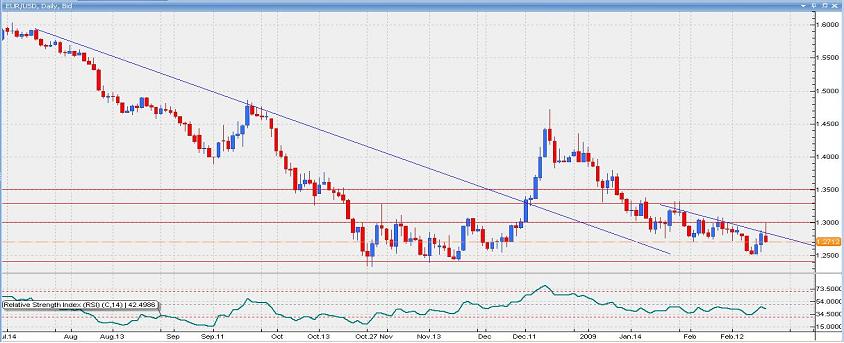Dollar and Sterling Gain on Bank Rescue Plans
* The dollar gained in volatile New York trading Monday, boosted by safe haven flows as the Dow industrials dropped 3.4% to its lowest closing level since May 1997. Despite increased risk aversion, the yen depreciated to the lowest level against the dollar since December and fell versus the other key currencies as the US pledged to inject more funds into banks. Sterling rose against the dollar on speculation the UK may introduce an asset-protection plan to insure banks against further losses. The Canadian dollar was little changed after erasing an earlier gain, following Canadian retail sales’ largest decline since January 1991. The Australian dollar fell modestly.
* The EUR/USD dropped sharply after failing to break the 1.30 resistance and European Central Bank President Jean-Claude Trichet’s comments. Trichet said the eurozone’s financial system is facing challenging times as financial markets and the economy are spiraling downwards. He stressed that financing in the eurozone is dwindling with indications that falling credit flows are partly the result of supply-side factors and tight financing conditions associated with deleveraging. The EUR/USD downtrend is still intact. We expect a new test of the important 1.24-1.25 area support. If the support is broken, the pair will plunge. If the support holds, it will indicate an important bottom.

www.cmsfx.com
Financial and Economic News and Comments
US & Canada
* President Barack Obama pledged to cut the US fiscal deficit in half by the end of his first term, stressing the significance of responsible spending and transparent accounting practices. “As our interest payments rise, our obligations come due, confidence in our economy erodes and our children and our grandchildren are unable to pursue their dreams because they’re saddled with our debts. That’s why today, I’m pledging to cut the deficit we inherited by half by the end of my first term in office,” President Obama said at a White House summit on fiscal responsibility.
* Federal Reserve Bank of Atlanta President Dennis Lockhart forecasts a meager US economic recovery in 2009, saying capital injections by the Treasury have strengthened banks’ balance sheets. However, he warned of risks to recovery from international weakness, such as Japan’s deflationary concern.
* Texas manufacturing activity deteriorated further in February, with the Dallas Fed general business activity index declining to -57.3 from January’s -50.5, the Federal Reserve Bank of Dallas said. Indexes for current activity remained at extremely low levels in February; the production index fell to -36.1 from -15.4, capacity utilization fell to -37.2 from -19.2, new orders fell to -41.2 from -38.4, and shipments fell to -38.1 from -25.9. Labor markets weakened further in February, with the employment and average workweek indexes remaining negative for the seventh straight month as manufacturers continued to trim payrolls. The index of prices paid for raw materials increased to -35.1 in February from -44.2 in January, while the index of prices received for finished goods declined to -31.9 from -26.0. Indexes of future activity indicate the region’s manufacturers expect little or no growth in demand over the next six months, the Dallas Fed said.
www.cmsfx.com
* Canada’s retail sales fell a more-than-expected 5.4% m/m December to C$33 billion ($26.5 billion), the third consecutive decline and biggest drop since January 1991, after declining 2.4% m/m in November, according to data from Statistics Canada. New car sales fell 15.0% m/m in December, down 23.0% y/y. Excluding the automotive sector, retail sales declined a more-than-expected 3.2% m/m, following November’s 2.3% m/m decrease.
www.cmsfx.com
Europe
* European Central Bank President Jean-Claude Trichet said the first signs of falling credit flows in the eurozone have begun to emerge, warning that deteriorating credit flows associated with deleveraging must be closely watched. “If such behavior became widespread across the banking system, it would undermine the raison d\\\\\\\\\\\\\\\'être of the system as a whole,” Trichet said, adding that financial systems remain under “severe strain” that can hamper economic recovery. He outlined ways to strengthen the financial system, including ensuring the system is sustainable in the long term, improving banks\\\\\\\\\\\\\\\' resistance to shocks, and “extending regulation and oversight to all systemically important institutions - notably hedge funds and credit rating agencies.”
Asia-Pacific
* Japan, China, South Korea and 10 Southeast Asian nations agreed to form a $120 billion pool of foreign-exchange reserves that can be used to defend their currencies in an effort to battle the global financial crisis.
* Supermarket sales in Japan fell 2.7% y/y in January after falling 2.8% y/y in December, the Japan Chain Stores Association reported.
* Thailand’s GDP contracted 4.3% y/y in Q4 2008 on declines in exports and tourism, the largest contraction since Q4 1998, the government said, predicting that the economy is shrinking at least that much in Q1 2009.
FX Strategy Update

Hans Nilsson 2009-02-23
©2004-2008 Globicus International, Inc. and Capital Market Services, L.L.C.
Source: Hans Nilsson
23.02.2009



 Currency Charts
Currency Charts